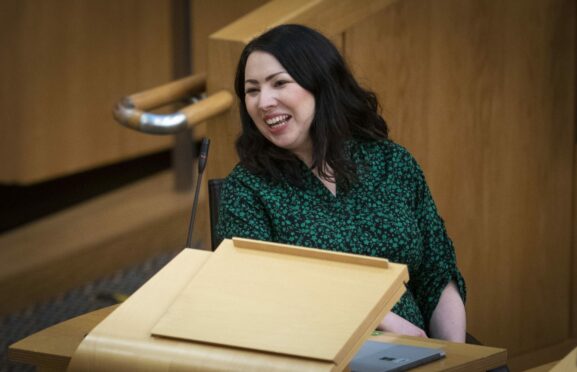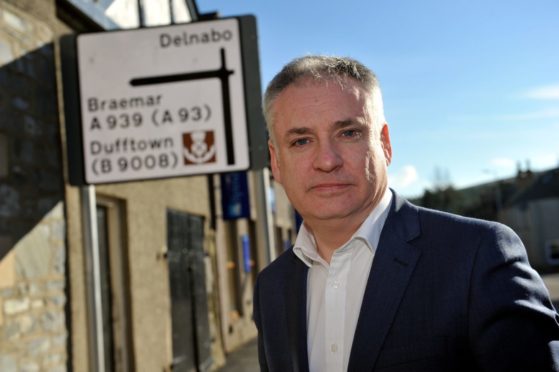Should people be able to take time off work for the menopause?
That’s a question Labour MSP Monica Lennon wants us to think about.
She is calling for businesses and public sector bodies to consider the idea of giving people special leave for period pains, perimenopause and the menopause.
And she wants workplaces to be more open to discussing taboo topics like the menopause so people have a better understanding of what some of their colleagues are going through.
‘This is good employment practice’
Ms Lennon said: “Women’s health has been under-resourced and overlooked for quite a long time.
“The Scottish Government has a really good women’s health plan, but it is the resourcing of that which remains a challenge.
“Governments need to think about what a good, modern workplace looks like, where it is not taboo to talk about menstruation and menopause leave.
“This is all good employment practice which should be mainstream, not something on the periphery.”
She said many people are having to reduce their hours or drop out of work altogether because they cannot cope with their menopausal symptoms.
Ms Lennon added: “This means women are losing their confidence and self-esteem, and it affects their income which in turn affects their pensions.
“This is not a trivial issue.
“It is not just a politician talking about periods again – it is really important for our labour market.”
Break the silence on the menopause
We went to discuss Ms Lennon’s suggestions with Rachel Weiss from Perth.
Ms Weiss founded the Menopause Cafe in 2017, a worldwide network of pop-up cafes where people of all ages can go along to talk about the menopause.
More and more people are now talking openly about the menopause, including First Minister Nicola Sturgeon.
But Ms Weiss said one of the biggest problems is 70% do not tell their employers if they are menopausal.
She said: “The first thing that needs to change is the silence.
“If we experience menopause and speak about it to our employers, we stand a better chance of being able to take time off.
“Around 20% will sail through the menopause with no symptoms.
“Then 60% have symptoms they can learn to manage.
“But we need to remember the other 20% who do suffer debilitating symptoms and need support to be able to continue working.
“It is ridiculous to talk about this in 2022 – periods have been going for a while.
“My theory is women are so desperate to be accepted as equal to men they play down the real differences in our bodies.”
As well as offering menopause leave, Ms Weiss suggested businesses could make other adjustments, including making uniforms more breathable, having temperature controls and allowing people to bring notebooks into meetings in case they get brain fog.
Could it be good for business?
One worry employers might have is the cost.
But Ms Lennon said offering people a day off on a regular basis because of the menopause “shouldn’t be a huge undertaking” for employers.
She said: “Being able to have a supportive conversation with your line manager or colleague is important.
“If people feel valued in the workplace they always show good loyalty in return and will want to be part of the team and feel pride in their work.”
If people feel valued in the workplace they always show good loyalty in return.”
– Monica Lennon MSP
This is something Ms Weiss, who runs Rowan Consultancy, agrees with.
She said as an employer she would rather make adjustments for the people who work for her.
“I don’t want to lose good employees,” she said.
“It is financially cheaper to make adjustments for someone’s health than lose an experienced employee and hire a new one.
“There is a Victorian view that people are a cost and can be easily replaced, but 150 years later we have a labour shortage and employees need to be valued.”
Government to prioritise menopause
Ms Lennon has since written to the Scottish Government asking it to clarify its position on menopause leave.
Despite employment law being reserved to Westminster, Employment Minister Richard Lochhead said menopause policy is one of the government’s top priorities in its women’s health plan.
He said: “The Scottish Government has committed, through the women’s health plan, to develop a menopause and menstrual health workplace policy, as an example of best practice, starting with NHS Scotland, and promote this across the public, private and third sector.
“Our recently launched NHS Inform women’s health platform includes accessible information to help women feel more informed and confident about the menopause and includes information on menopause and the workplace, for those experiencing the menopause as well as line managers and employers.”
He added: “Through this we are asking employers to adopt fair work practices such as enabling workers to have an effective voice, tackling gender pay gaps and offering flexible working from day one of employment which can especially benefit women experiencing menstrual or menopausal issues while at work.”



